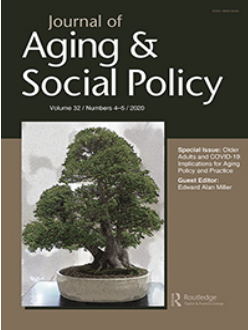Article, Refereed Journal
Journal of Aging & Social Policy

As the coronavirus crisis spreads swiftly through the population, it takes a particularly heavy toll on minority individuals and older adults, with older minority adults at especially high risk. Given the shockingly high rates of infections and deaths in nursing homes, staying in the community appears to be a good option for older adults in this crisis, but in order for some older adults to do so much assistance is required. This situation draws attention to the need for benevolent intervention on the part of the state should older adults become ill or lose their sources of income and support during the crisis. This essay provides a brief overview of public support and the financial and health benefits for older individuals who remain in the community during the pandemic. It reports the case example of Austin, Texas, a city with a rapidly aging and diverse population of almost a million residents, to ask how we can assess the success of municipalities in responding to the changing needs of older adults in the community due to COVID-19. It concludes with a discussion of what governmental and non-governmental leadership can accomplish in situations such as that brought about by the current crisis.
Research Topic
Health Care and Health Policy

